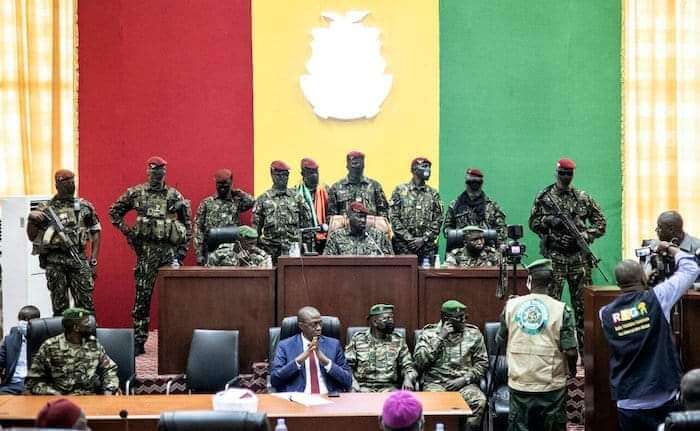|
LISTEN TO THIS THE AFRICANA VOICE ARTICLE NOW
Getting your Trinity Audio player ready...
|
Guinea’s Junta Dissolves Gov’t, Seals Borders
Guinea’s military junta, led by Colonel Mamady Doumbouya, Monday sent shockwaves through the West African nation by dissolving the government in a surprise move. This latest development, announced through a presidential decree read on state TV, further tightens the junta’s control and raises questions about the future of democracy in Guinea.
The announcement, delivered by the presidency’s Secretary General, Brig Gen Amara Camara, provided no explanation for the dissolution nor offered a timeline for forming a new government. The move came as a surprise, following the appointment of Prime Minister Bernard Goumou just last July.
The junta’s actions extended beyond dissolving the government. Ministers were ordered to surrender their official vehicles and passports, while their bank accounts were frozen. Additionally, security forces received instructions to “seal” all borders until the complete handover of ministries to the junta. Lower-level officials will temporarily manage these ministries until a new government is formed.
This escalation comes two and a half years after Colonel Doumbouya staged a coup d’état, ousting democratically elected President Alpha Condé in September 2021. The coup followed widespread protests against Condé’s controversial bid for a third term.
Guinea’s situation mirrors a worrying trend in West and Central Africa, where several countries, including Mali, Burkina Faso, Niger, and Gabon, have experienced coups in recent years. These developments have drawn strong condemnation from regional and international bodies, including the Economic Community of West African States (ECOWAS), the African Union, and the United Nations.
While the junta promised a 24-month transition period leading to democratic elections, the recent developments raise concerns about its commitment to this timeline. Guinea is currently expected to hold elections in October 2024, marking the end of the transition period agreed upon by the junta and ECOWAS.
The dissolution of the government creates uncertainty and anxiety in Guinea. While the junta has yet to clarify its motives or next steps, international observers urge them to prioritize transparency, respect for human rights, and a swift return to civilian rule.
Somalia Inks 10-year Defense Pact With Turkey
The Somali Parliament has ratified a significant defense agreement with Turkey, bolstering its maritime security capabilities and potentially raising eyebrows in its neighboring country, Ethiopia.
The ten-year pact, approved on Tuesday, outlines Turkish assistance in arming and training Somali naval forces, alongside the deployment of Turkish vessels within Somali waters. Analysts hail this move as a critical step towards safeguarding Somalia’s maritime security, long plagued by piracy, illegal fishing, and toxic waste dumping.
“This agreement eliminates fears of terrorism, piracy, illegal fishing, and the dumping of toxic waste,” declared Prime Minister Hamza Abdi, highlighting the multifaceted benefits of the deal.
This development comes amidst rising tensions with Ethiopia, following its controversial agreement with the self-declared republic of Somaliland. Somalia considers Somaliland part of its territory and accuses Ethiopia of violating its sovereignty with this move.
The Turkish-Somali defense agreement could potentially fuel existing tensions further, particularly considering Ethiopia’s own maritime interests in the region.











LEAVE A COMMENT
You must be logged in to post a comment.